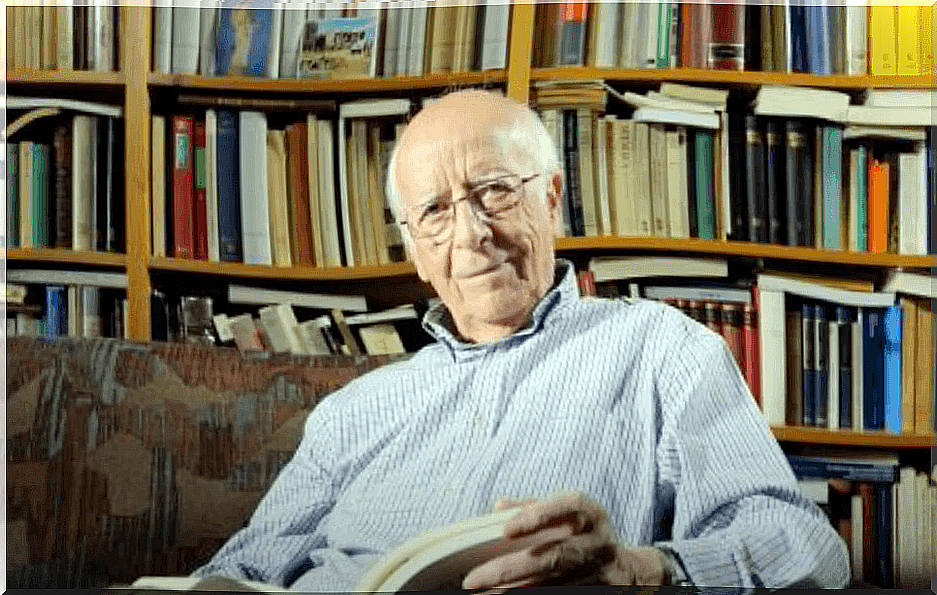The Three Roots Of Evil, According To Emilio Lledó

Emilio Lledó is a Spanish philosopher, member of the Royal Spanish Academy and ex-Cathedral of the Universities of Heidelberg and Barcelona, among others. His work has crossed borders and has the value of having been produced by one of the minds that has known, almost intimately, the great thinkers of history. In some of his interviews he has referred to the three roots of evil, or rather, contemporary evils.
Lledó is very critical of some contemporary aspects, such as the divinization of money, the lack of training in leaders and the profound inequalities in the world. It questions the transformations in education that have been leading to a transgression of values.
For Emilio Lledó, the three roots of evil are ignorance , greed and selfishness. Although these are vices that have always existed, at the present time they have gained singular importance and define a good part of individual and social behavior. Let’s see what you think about it.

1. Emilio Lledó and ignorance
Emilio Lledó has pointed out that “The human being is what education makes of him.” In this sense, education would not be instruction, but a process of formation of conscience: a path towards freedom / autonomy of thought.
This includes the education of sensitivity, because in true education rationality must not only be cultivated. In Emilio Lledó’s opinion, this is the only way to save oneself from the manipulation and aggressiveness that occurs when there is no understanding.
He thinks that education based and measured on exams is deforming. He sees it as an inquisitorial system that helps fear and little intelligence. True formation must be based on freedom; if not, the mind is corrupted, with the rest of the corruptions that come after it, such as the economic one.
He thinks that a good part of today’s politicians only represent ignorance; a lack of knowledge similar to the one that would prevail in his electorate. “They go up and sink everything,” he says, starting with free and universal education.
2. Greed, one of the three roots of evil
Emilio Lledó thinks that the obsession with money is the great misfortune of today’s society. Those who do not profit pass for fools, because many cannot separate well-being from money, even when they are two realities that only have a fragile link. In fact, you can be reasonably happy without a lot of money.
The real wealth, personal and social, is in the culture. This is what allows us to understand and live essential principles such as justice, good, truth and beauty. Money, on the other hand, makes people miserable, unleashes their greed, corrupts and degenerates. The philosopher says that this constitutes “the return to the cave in the most sinister sense of the word.”
All human beings, on the other hand, have an essential need to know, a need for culture. Only education could satisfy that desire and allow us to build a critical conscience that prevents the prevalence of corruption in power.
Greed has led us to now be in a world that expects a lot from technology and the economy, but is full of hopeless people. The laws of the market generate inequality and that is detestable. At the same time, they fuel greed, which is deplorable.

3. Selfishness
For Emilio Lledó the greatest of all evils is ignorance, which is not only intellectual, but also includes sensitivity. This leads to the third of the three roots of evil: selfishness, that impulse that leads to promote or sustain global dictatorships or small personal dictatorships.
He points out that a matrix of thought dominated by pragmatism has been imposed, “practicality”, he calls it. This leads to a gross utilitarianism that corrupts. It is seen more in the figures of power, whom it describes as “degenerates with all its letters”.
In front of the “well-being”, Lledó opposes the “well-being”. This supposes a minimum of decency and the latter implies the possibility of seeing and feeling beyond the strictly private and limited domain. At present, that is not what education proclaims, that compares, that puts some above others and on that basis establishes a consciousness of exclusion instead of motivating solidarity. That is what must change.









